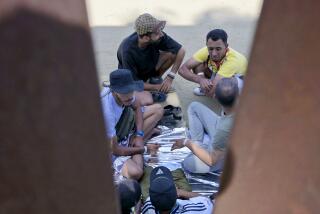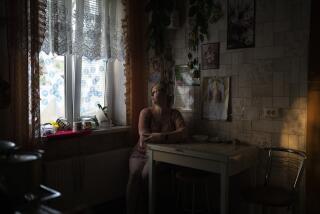Long Nights at the Border, Living in Fear of Unknown
- Share via
DJENERAL JANKOVIC, Yugoslavia — Only nine cars full of Kosovo Albanian refugees were left waiting to cross from here into Macedonia on Tuesday, and Aishe Rexhbogoj had slept in the driver’s seat of one of them for nine nights.
Rexhbogoj, 45, and her daughter Saranda, 14, were second in line on the Yugoslav side of the border, stuck living in a black Renault because Macedonia has closed its border.
Rexhbogoj would give up and drive back home, as hundreds of other trapped refugees have over the last couple of days, but she isn’t sure it’s safe in Kosovo’s capital, Pristina.
“I told the police: ‘If you can guarantee our lives, we will go back to our home,’ ” Rexhbogoj said through the open door of her car.
What was a flood of Kosovo refugees a couple of days ago has suddenly dried up at Djeneral Jankovic, the main border crossing between Kosovo--a southern province of Serbia, the dominant republic in Yugoslavia--and Macedonia.
Serbian police began telling refugees to turn around and go back to their homes in Kosovo on Monday night as authorities in Belgrade, the Yugoslav and Serbian capital, prepared to declare a unilateral cease-fire in their war with the ethnic Albanian guerrillas of the Kosovo Liberation Army.
Dozens of cars and tractors pulling wagonloads of ethnic Albanian refugees were heading north back into Kosovo along the main highway Tuesday after giving up at the Macedonian border.
On the other side of the border, the thousands of people still trying to move into Macedonia are trapped in a kind of no man’s land by Macedonian police, who have penned them in, standing shoulder to shoulder, surrounded by steel barricades and a barbed-wire fence.
“They [the Macedonians] don’t have the right to do that under international law,” complained one of the men stuck on the Yugoslav side of the border.
Rexhbogoj’s 16-year-old son and another son, 20, and his 17-year-old wife crossed into that no man’s land to look for bread a few days ago and never came back. She doesn’t know where they have gone.
“I cannot return because half of my family is on the other side,” Rexhbogoj said through an interpreter. “I will not return without my children.
“The Macedonians took people away in trucks and buses, so maybe they are in Macedonia now.”
According to relief workers in Macedonia, the scene at Djeneral Jankovic does not appear to be representative of the still very bleak refugee picture at other crossings.
The Office of the U.N. High Commissioner for Refugees estimated that 50,000 people were backed up at the Jazince border crossing west of Djeneral Jankovic, about two-fifths of them on the Macedonian side of the border and the rest on the Yugoslav side. A Macedonian news service reported Tuesday that Yugoslav authorities had shut the border at Jazince.
U.N. refugee agency officials said refugees might have been scarce at the Djeneral Jankovic crossing--opposite Blace in Macedonia--because it has been virtually closed by the Macedonians for days, except to trains. The refugee agency had reports that many people were leaving clogged border crossings and moving to the ones where they thought they had a better chance of getting through, said Kris Janowski, spokesman for the agency.
Meanwhile, the U.N. is still seeing floods of refugees leaving Kosovo. For instance, 15,000 people crossed into Albania in a matter of hours Tuesday. Those coming in said there was an endless line of cars trying to get out of the province.
On Tuesday, Sadako Ogata, the U.N. high commissioner for refugees, accused Yugoslav President Slobodan Milosevic of rechanneling the refugees in order to create the most chaos.
The flight of Kosovo Albanians was “forced, planned and directed” in an effort to destroy their identity, Ogata told an emergency meeting of donor nations in Geneva.
Although there were no signs of coercion at the Djeneral Jankovic checkpoint, a long column of cars in the line with Rexhbogoj had returned home, she confirmed. Like many people who fled Pristina, she said men in police uniforms and wearing black masks had ordered her to leave the capital. Then, after Rexhbogoj and her daughter had been living at the border more than a week, Serbian police reversed the order and told them to go home, she said.
“The police said that the Macedonians are not letting anyone in anymore, that we’re waiting for nothing,” Rexhbogoj said. “For eight days, we’ve been eating bread and water.”
As Rexhbogoj spoke, her daughter was reclining in the passenger seat, fed up with going nowhere. She was eating from a package of Petit Beurre cookies and drinking coffee from a porcelain cup.
Her mother had an almost empty carton of peach juice, but she couldn’t afford to buy more, she said. The Serbian shop owner who sold it to her had charged an extortionate 10 German marks (about $5.50), at least five times the normal price, Rexhbogoj said.
Rexhbogoj added that she has a sister who lives in New York.
Lined up on both sides of the road behind her car, and in a parking lot just below, were at least 600 abandoned cars and tractors. Bundles of clothing were left scattered in wagons as the refugees fled on foot for Macedonia.
More than 100 cars full of Kosovo Albanian refugees stranded on the Yugoslav side of the border turned around and headed back north into Kosovo on Monday night.
Tuesday morning, a convoy of about 25 cars was driving north along the road to Pristina. Most of the vehicles carried four or five refugees and their belongings and had Pristina license plates.
Four farm tractors pulling about 140 ethnic Albanian refugees in wagons were also heading north, near the turnoff to the almost deserted city of Urosevac.
A few minutes’ drive behind them, a convoy of four Yugoslav army T-55 tanks, an armored personnel carrier and two trucks lumbered up the highway, also heading north.
Before the war, Urosevac had a population of about 50,000, but it looks more like a military encampment now, with Serbian soldiers and heavy armor dug in and sandbagged throughout the ruined city.
On the main road into Urosevac, long rows of shops have been looted and burned, and only a tiny minority of Serbian families remains among the military and police forces.
Three Serbian women were buying bread at the window of a forlorn-looking bakery surrounded by the charred ruins of a once-thriving shopping district.
*
Times staff writer Elizabeth Shogren in Skopje, Macedonia, contributed to this report.
All of Paul Watson’s dispatches from Kosovo are available on The Times’ Web site at https://www.latimes.com/dispatch.
More to Read
Sign up for Essential California
The most important California stories and recommendations in your inbox every morning.
You may occasionally receive promotional content from the Los Angeles Times.













